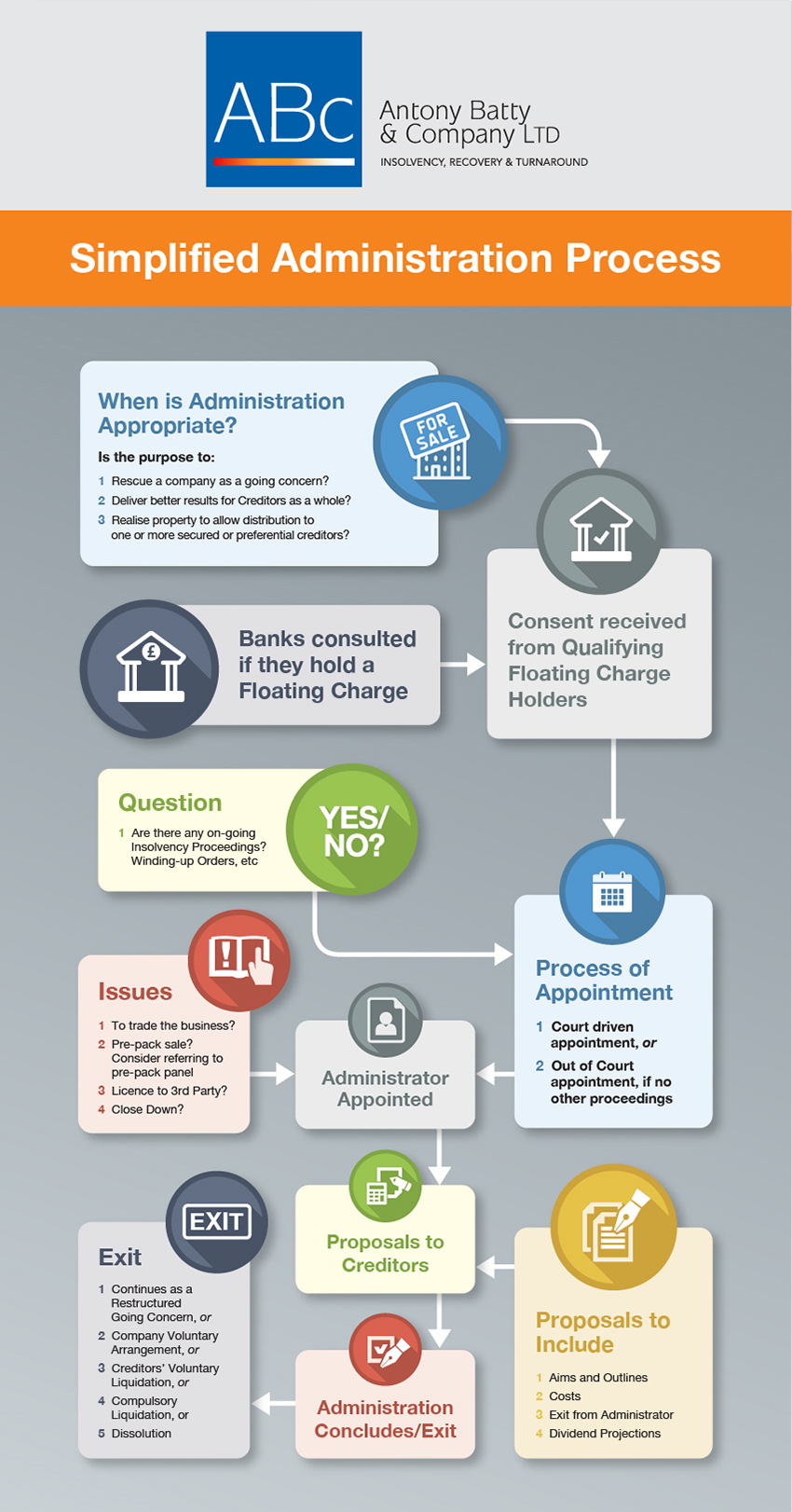When is a Company Administration procedure used? How can one help my company?
A Company Administration is used when at least part of an insolvent business can be sold or salvaged
Company Administration is an insolvency procedure designed to rescue a company (separate from a Company Voluntary Arrangement) being used if it is considered that all or part of an insolvent business can be sold or salvaged as a viable going concern.
See how trade credit and insolvency pressures can lead to Administration.
An Administrator is appointed to control the business of an insolvent Company and ensure that the proposals put to the creditors are properly formulated and implemented.
Need help?
If your business is facing insolvency, the sooner you contact us, the more we can help.
What is a Company Administration?
Hugh Jesseman, Licensed Insolvency Practitioner explains about Company Administrations
via Google Reviews
We are experienced in Company Administration
The first matter that has to be dealt with is to appoint an Administrator. Only Licensed Insolvency Practitioners can be appointed as Administrators. When appointed as a Company Administrator we will effectively take charge of the running of the business. During an Administration, protection from creditors’ claims means there is time to develop a plan for the company’s future.
We are experienced in Company Administration and as part of our role we speak to the business’s bankers, HMRC and major suppliers to explain our plans in more detail in order to gain their support. This often requires delicate and confidential negotiations to achieve the best possible outcome, and we have experts that are very experienced in doing so.
What is a Pre Pack Administration? It is essentially the same thing as an Administration. The difference between the two procedures is that with a pre-pack there is already a purchaser for the business and that all the terms of sale have been agreed in advance of the appointment of the Administrator. This means that the sale of any company assets can be completed as soon as an Administrator has been appointed.
What issues need to be considered before an Administrator is appointed?
Once the decision has been made to opt for administration, the company directors can choose to appoint an Administrator who will then be responsible for the affairs of the company. Often several Administrators are considered before the appointment is made. However, holders of floating charges (often a bank or banks) can force the appointment of an Administrator if the company has not upheld the conditions of any debenture agreement.
Issues that need to be considered prior to the appointment include:
- Is it possible to continue to trade the business? In other words will it be able to pay its debts and meet its obligations in the future?
- Is a pre-pack administration a possible option? If yes, consideration needs to be given to referring the matter to the pre-pack panel.
- Could it be licenced to a 3rd party?
- Are there any existing Insolvency Proceedings in place, such as a winding up petition or order?
- Is closing the business down the only viable option, all debt management and debt solutions having been considered?

What are the benefits of Administration in relation to creditors’ rights?
Administration protects a company from creditor or legal action whilst a strategy which benefits all stakeholders, in particular creditors, is formulated and proposed to creditors (often at a ‘creditors meeting’).
The Enterprise Act 2002 introduced an out of Court mechanism for the appointment of Administrators. This has made the process more mainstream by becoming streamlined and as a consequence, less expensive to implement.
The Administration procedure can significantly increase realisations for the benefit of creditors. We have also used the procedure to rescue a number of companies which have subsequently successfully exited Administration.
What happens during an Administration?
- Creditors cannot take any legal action against the company, including claims, without permission of the court. This gives the company time to formulate a plan to address its debts.
- This removal of any threat from creditors reduces the possibility of any company directors indulging in wrongful trading, which can lead to directors becoming personally liable.
- Finally, a company that has entered into Administration can protect itself from being place into compulsory liquidation if a Winding Up Petition has been issued against it.
The Company Administration Process – Simplified
The Company Administration process is usually seen as quite complex, and it often is, although sometimes it can be fairly quick and straightforward. It all depends on the specific circumstances of the company involved. However, the main steps in the process are the same – it’s how the administrator deals with these steps that really counts.
We have put together this infographic which simplifies the process. Full details of the Administration Process can be found in the insolvency legislation that makes up the Companies Act, 2006.

Company Administration FAQs
The Administration must follow the procedure set out in the Insolvency Act 1986. Our Licensed Insolvency Practitioners will assist you with the preparation and application for Administration at each stage, including drafting notices, minutes and other documents where appropriate, but the ultimate responsibility remains with you, the director(s).
The following main steps must take place in each appointment.
A quorate meeting of the Board of directors will have to approve the issue of notices required by statute to place the Company into Administration and confirm that we are instructed to assist with the formalities. We will provide standard minutes that include resolutions which, among other matters, will deal with our pre-appointment fees and appoint us to assist with the Administration appointment.
Where the Company has a floating charge holder who is, or may be, entitled to appoint an Administrative Receiver or Administrator out of court, they must be given 5 business days notice of the intention to appoint an Administrator within statutory timescales. Upon filing the notice of intention to appoint in Court, the Company will obtain an interim moratorium giving it protection against creditor action. It may also be necessary to give notice of intention to appoint an Administrator to other parties, such as the Company itself.
A formal notice of appointment has to be issued to the court.
After the appointment, the Administrator is required to issue and advertise a variety of notices for the attention of the Registrar of Companies, the Court, other statutory bodies such as HM Revenue and Customs and the members of the Company and creditors generally.
The Board will be required to complete a statement of truth to verify the accuracy of the contents of a statement of affairs on behalf of the Company. We can assist you in preparing a draft statement of affairs from information that the Board provides, but it remains the Board’s statement and those who complete the statement of truth will be ultimately responsible for any false disclosure or omission.
As soon as reasonably practicable after the appointment, but in any event within 8 weeks, the Administrators will issue their proposals to the Registrar of Companies, Court and creditors, setting out how they intend to achieve the purpose of the Administration.
The Administrators may also seek a decision from the creditors when they issue the proposals, although this will only be necessary if there is a prospect of a distribution to unsecured creditors. If such a decision is sought, the creditors will have the opportunity to modify the Administrators’ proposals, appoint a Committee to assist the Administrators and, if no Committee is appointed, fix the basis of the Administrators’ fees and disbursements and approve any pre-Administration costs not already paid if they are to be paid from asset realisations in the Administration.
If a decision is not sought from the creditors, it will be for the secured and preferential creditors to fix the basis of the Administrators’ fees and approve pre-Administration costs in accordance with the legislation.
Within the first three months following his appointment, the Administrator is required to complete a confidential online report to the Secretary of State on the conduct of those who have been directors, or shadow directors, of the Company in the last 3 years.
The information contained in the online report could result in the Secretary of State taking action to disqualify one or more of the directors, or shadow directors, from managing a Company for a period of between 2 and 15 years.
The method used to exit from the Administration will depend on several factors and the most appropriate exit route will be considered by the duly appointed Administrator. It is possible that the most appropriate exit route may be through either compulsory or voluntary liquidation. Consequently, we would also like to take this opportunity to draw your attention to the provisions of Section 216 and 217 of the Insolvency Act 1986.
In essence, Section 216 lays down the prohibition on re-using company names to prevent deceptive “phoenix” operations, and Section 217 provides a powerful financial consequence for directors who ignore this prohibition, making them personally liable for debts incurred during the period of non-compliance.
An order made in a county court to arrange and administer the payment of debts by an individual; or an order made by a court in respect of a company that appoints an administrator to take control of the company. A company can also be put into administration if a floating charge holder, or the directors or the company itself file the requisite notice at court. An Out of Court Administration process was introduced by the Enterprise Act 2002.
The title of an Insolvency Practitioner (IP) appointed by the holder of a debenture that is secured by a floating charge that covers the whole or substantially the whole of the company’s assets. The IP’s task is to realise those assets on behalf of the debenture holder.
The process where an IP is appointed by a debenture holder (lender) to realise a company’s assets and pay preferential creditors and the debenture holder’s debt. The right of a debenture holder to appoint an administrative receiver has been restricted by the Enterprise Act 2002.
An IP appointed by the court under an administration order or by a floating charge holder or by the company or its directors filing the requisite notice at court.


